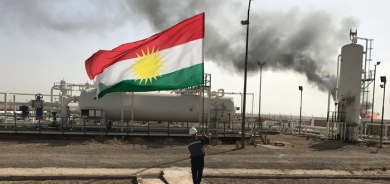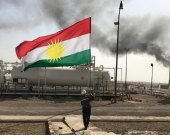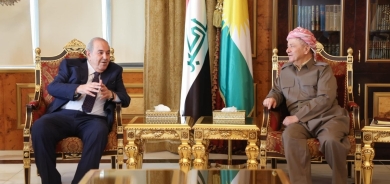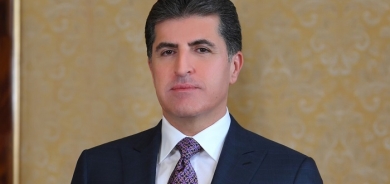Masoud Barzani to speak about Operation Provide Comfort’s 30th anniversary in KRG-sponsored webinar

In 1991, as the Gulf War ended, millions of Iraqi Kurds fled to the Turkish and Iranian borders, fearing Saddam Hussein would use chemical weapons against them, as he suppressed their post-war uprising.
Although the US intended Provide Comfort to be a limited, humanitarian operation, it blossomed into the autonomous Kurdistan Region that we know today—which many prominent figures have hailed, including, most recently, Gen. David Petraeus.
New Revelations Likely
Also speaking at the webinar will be then-US Secretary of State, James Baker, whose visit to the Iraqi-Turkish border in early April 1991 triggered the prompt reversal of US policy—which had focused on securing a coup in Baghdad to overthrow Saddam.
Baker has never before spoken publicly to a broad audience about those events. Barzani may well have discussed them with a Kurdish audience or in private, but not with a broad Western audience.
The same is true for a third speaker: Hoshyar Zebari, then the KDP’s Chief Foreign Representative and, after 2003, Iraq’s first post-Saddam Foreign Minister. Zebari, too, was closely involved in the events of 1991.
This was a crucial period, but it has been little explored and is little understood. Most likely, these speakers will provide crucial new insights.
Other speakers include the military officers who carried out Provide Comfort. Significantly, they came from EUCOM—European Command—under which Turkey, which pressed for action, falls. Notably, they did not come from CENTCOM, which was marking what it viewed as a swift victory, achieved in a mere 100 hours of ground combat.
President Joe Biden’s administration is the friendliest toward the Kurds ever to govern Washington. Indeed, in late 2017, this reporter chanced to meet Biden at a local grocery store. Speaking of his time in the Obama administration, Biden said, “I wish we could have done more for [the Kurds],” adding, “Masoud Barzani is a good friend of mine.”
Representing the Biden administration at Wednesday’s webinar is Brett McGurk, Middle East Coordinator on the National Security Council, and Dana Stroul, Deputy Assistant Secretary of Defense for the Middle East.
“Those who Don’t Learn from History…
...are doomed to repeat it,” goes the famous saying. People tend to take for granted what they have, considering it almost a natural right. But if they don’t understand how they came to enjoy those good things, they may well not understand what is necessary to keep them, and, eventually, they will lose them.
Five years ago, on the 25th anniversary of the end of the 1991 Gulf War, Kurdistan 24 published a series of articles covering the period from President George H. W. Bush’s unilateral declaration of a ceasefire in late February until the Kurdish exodus a month later.
Those events were a prelude to a crucial visit that Baker paid in early April to the Turkish-Iraqi border, where some one million Kurds had fled and who were suffering in the miserable cold of early spring in the mountains.
Baker’s visit precipitated an abrupt shift in US policy, as Washington moved to address the humanitarian crisis, rather than try to ignore it.
Our series on the 25th anniversary of Provide Comfort is based on interviews conducted in the Kurdistan Region in the summer of 1993 by this reporter and Kamran Karadaghi, then a journalist with al-Hayat and later, after 2003, chief of staff to Iraq’s first Kurdish president, Jalal Talabani. Masoud Barzani, as well as Talabani, spoke with us, and the series can be found on this page.
The series begins by explaining that the US leadership, including the military, was too quick to declare victory in 1991 and overly focused on a quick departure from Iraq in order to avoid a “quagmire.”
America’s Middle Eastern allies were stunned when Bush unilaterally declared a ceasefire. “The Saudis [had] wanted to press on, as did their Egyptian allies,” The New York Times reported. Five years later, Bush told the British journalist, David Frost, “I miscalculated. I thought [Saddam] would be gone (ousted in a coup)."
Bush felt the US commander, Gen. Norman Schwarzkopf, mishandled the ceasefire talks. “At the war’s end,” a senior US military officer later told this reporter, “the uniformed services unanimously thought that there would be a coup, soon—within three or four weeks. It was such a unanimous view that probably some intelligence agency—CIA, DIA, or CENTCOM intelligence—had put out a strategic estimate.” Possibly, Schwarzkopf thought that his interlocutor in the ceasefire talks was involved in plotting a coup. That, at least, is what the transcript suggests.
Kurdish Unity; Keen Insights into Saddam; Planning for War
In 1986, the KDP and the Patriotic Union of Kurdistan (PUK) put aside their differences to establish the Kurdistan Front. In 1988, as the Iran-Iraq war ended, the Kurds faced bitter defeat. Barzani said at the time, encouraging his party, “There will be a time to renew our struggle. Since we have Saddam Hussein, there never will be stability in the region.”
A year later, in July 1989, Barzani advised a London audience that Saddam might well attack Kuwait. In February 1990, as Saddam began to threaten Israel and the Gulf states, the Kurdish leadership started to plan its options if Saddam should, in fact, invade Kuwait.
The Kurdistan Front established a committee, including senior figures from the two major parties, to think systematically about their options. If there was a war, they hoped it would produce a popular uprising. As war did, in fact, approach, they sent emissaries and equipment into Iraqi Kurdistan. And when it began, in January 1991, the Kurdistan Front had assigned individuals to administer every Kurdish town and city.
In some places, the post-war uprisings were spontaneous; in others, the Peshmerga played a more active role. In March, as the Iraqi army was driven out, there were “celebrations everywhere,” a man in Sulaimani told this reporter. People felt as if “they were breathing freedom for the first time since 1958.”
The postwar uprisings took the Bush administration by surprise, and a debate soon emerged about how to respond. Thomas Pickering, America’s UN ambassador, proposed turning the large area of southern Iraq held by US troops into a demilitarized zone to maintain leverage on Saddam. Baker flew to Riyadh to discuss that with the Saudis. Despite their strong anti-Shia sectarianism, the Saudis supported it: almost anything was preferable to leaving Saddam in power. In fact, they wanted to do more and arm the Shia.
However, the State Department’s Bureau of Near East Affairs opposed the idea, as did Schwarzkopf, while the National Security Council Adviser Brent Scowcroft had a similar view. He was focused on ousting Saddam through a coup in order to maintain Iraq’s territorial integrity.
On March 26, the White House ended a growing debate about whether the US should support the uprisings. It announced that the US would not shoot down Iraqi helicopters, which were playing a key role in suppressing the uprisings.
That day, Scowcroft flew to Riyadh. Hoshyar Zebari was there, part of an Iraqi opposition group that was meeting with senior Saudi officials to consider options for ousting Saddam.
The Saudis were “very enthusiastic,” Zebari told this reporter. But after Scowcroft’s visit, the Saudis told us, “Here are your tickets.”
The Kurds understood what was about to happen. Saddam’s forces had largely suppressed the uprisings in the south (using chemical weapons, despite US warnings) and they were turning north to the Kurdistan Region.
In 1993, Barzani reflected on those difficult days, just two years before. As so often, the mountains proved the Kurds’ greatest friends. The Peshmerga could not hold the cities, but in the narrow mountain passes, using their RPGs, they succeeded in disabling the Iraqi tanks, blocking their advance—the KDP at Korre and the PUK further south, at Azmar. That, at least, allowed the population to flee behind them in safety.
Under those circumstances, Barzani resolved to stand and fight. “I was very depressed,” he said. “I vowed that I would not leave Kurdistan. I will die here.”
“I have never in my life suffered so much,” he continued. “We were exhausted. Everything was collapsing around us. Deep down, I knew that Iraqi morale was low too, and if we could make this one stand, that would be it.”
Masrour Barzani, his eldest son, then a young man of 22, fought alongside his father and later recalled his father's iron resolve.
“We will never surrender, no matter what the consequences,” is how Masrour described his father’s attitude. This determination was “the reason for our success,” the younger Barzani said. “While everyone had lost hope, he decided to resist and not leave the country, knowing that we had very few people left with us.” It was this “hope and belief” that allowed us to emerge triumphant, he concluded.
The Bush administration first tried to ignore the humanitarian crisis that followed on its decision to let Saddam suppress the uprisings. That proved impossible, however, and soon after, James Baker became witness to the sea of human misery crowded along the Turkish-Iraqi border.
And very soon after that, Operation Provide Comfort began—a “turning point” for today’s Kurdish renaissance.















